We're an affiliate
We hope you love the products we recommend! Just so you know, we may collect a share of sales or other compensation from the links on this page at no additional cost to you. Thank you if you use our links, we really appreciate it!
We can visualize your frustration when realizing that your beloved cat did their bathroom business on your bed.
Some people might see this as an act of arrogance or disrespect from their furry friends, but we are here to tell you otherwise.
As you may already know, cats are known for their cleanliness and they love toileting in a clean area away from human traffic.
But, why is your cat peeing on your bed all of a sudden?
Keep reading to know the reasons for this behavior and discover our practical solutions which can work wonders in redirecting your feline friend to pee in the right area.
Why Is My Cat Peeing on My Bed All of a Sudden? 7 Common Reasons
1. Medical issues
One of the most apparent reasons why your cat may pee on your bed is because of underlying medical conditions.
Cats suffering from urinary tract infections, kidney diseases, or diabetes may find it hard to control their bladder, resulting in frequent and sometimes painful urination.
You can suspect an underlying health problem in cases where your cat urinates in other places including on the carpet, in addition to wetting your bed.
If your cat shows this odd behavior without warning, we recommend taking them to the vet for early diagnosis and prompt treatment.
Other clinical signs of health problems affecting urination include straining to urinate and appearing fatigued when urinating.
2. Stress and anxiety
Emotional conditions such as stress and anxiety can cause your cat to engage in various coping mechanisms such as peeing on the bed.
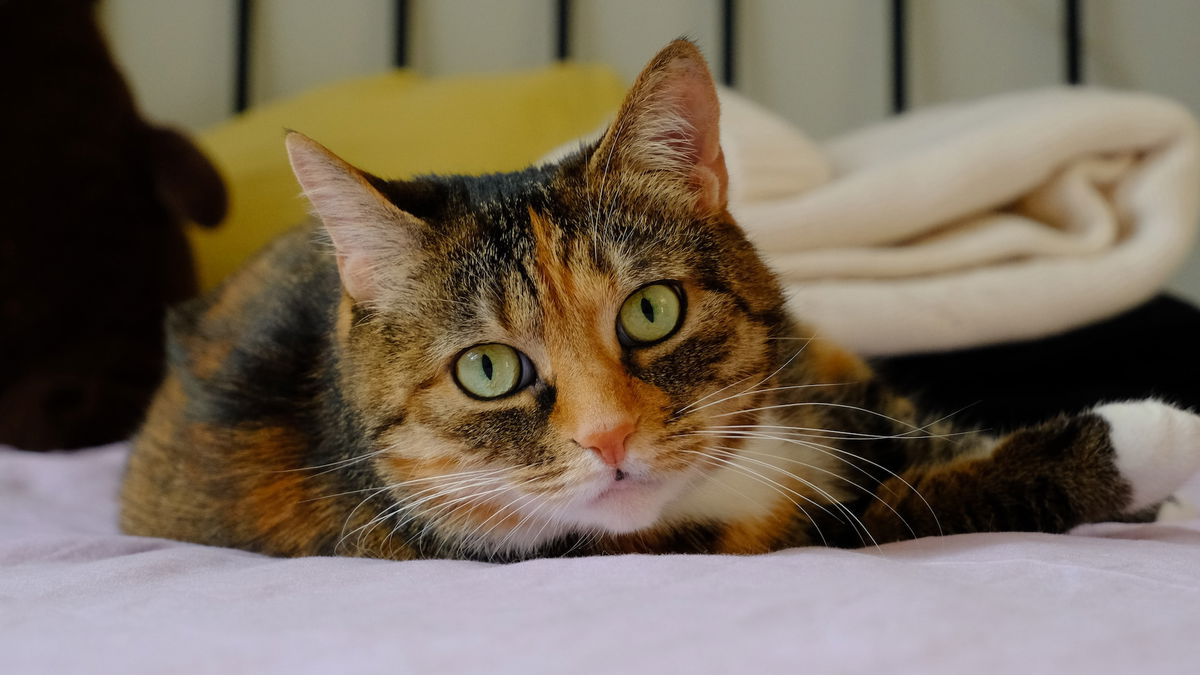
Some of the most common triggers of emotional distress in cats include changes in the environment, introducing a new cat, loud noise, or separation anxiety.
Pet parents need to understand the different factors that may stress their furry friend and work on ways to minimize the triggers.
3. Territorial marking
Cats are highly territorial animals and sometimes they may want to affirm their authority by marking various spaces, including your bed, with urine.
Sexually intact male cats are much more inclined to claim territory by spraying urine than their neutered counterparts.
Resident cats are also highly prone to compete for their owner’s attention when you bring a new cat home, because they may feel threatened.
4. Dietary changes
Recent changes to your cat’s food may alter their digestion pattern making them deviate from normal litter box habits.
Switching from a hugely dry diet to very wet foods may adjust your cat’s peeing pattern, occasioning frequent urination.
If you have to change your cat’s diet, make sure to do it slowly by starting small and gradually increasing the amount of new food as you observe your cat’s reactions.
5. Litter box cleanliness
A dirty litter box with a strong odor may push away your cat and force them to eliminate in various spots including your bed.
Maintain a good schedule of scooping your cat’s litter box to keep it fresh, or invest in a self-cleaning litter box for convenience, hygiene, and efficiency.
6. Inadequate litter box options
Waiting in line for a bathroom break may frustrate your cat. If you have multiple cats at home, make sure they have enough resources to promote a well-balanced living.
Lack of enough litter boxes may force your finicky feline to skip the waiting line and relieve themselves in another clean area, which can happen to be your bed.
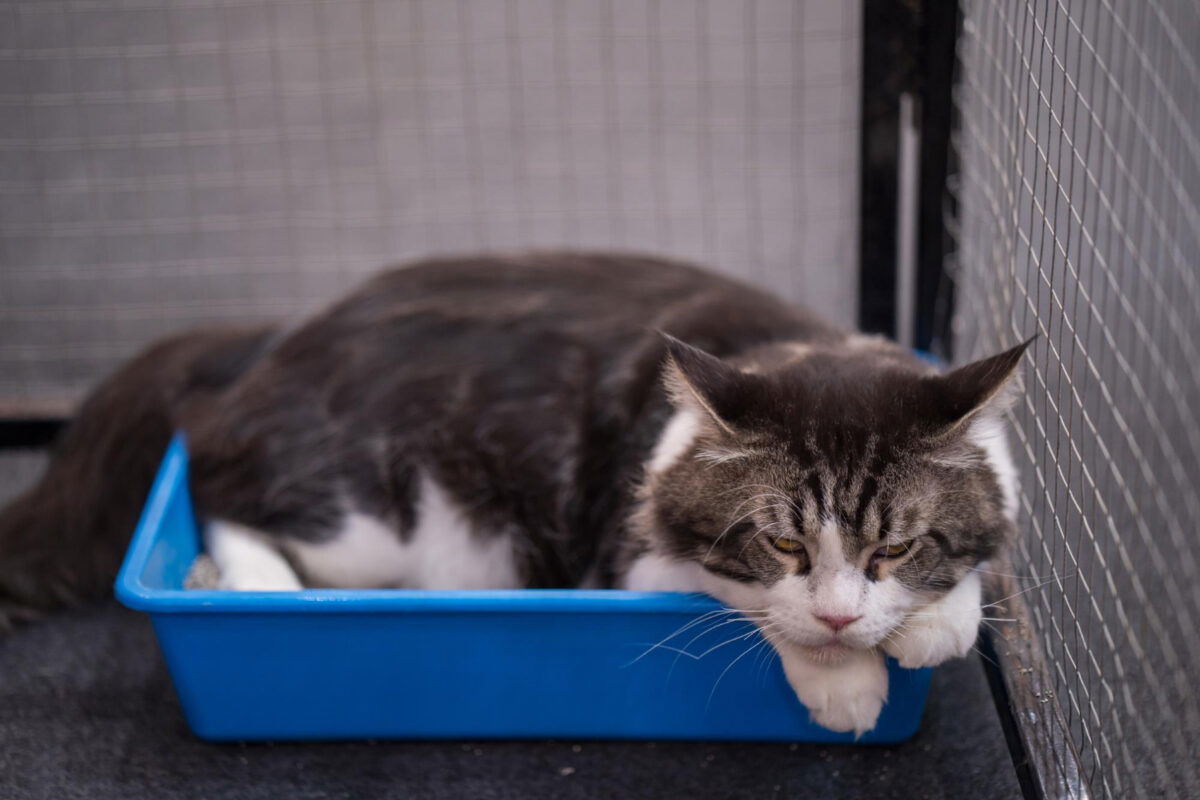
Some cats can be very choosy when it comes to using an accessory for eliminating. You may have to try a few cat toilets to see which one works for your beloved feline.
7. Environmental changes
Cats can do best when subjected to a known environment with a predictable routine.
Changing their immediate surroundings by shifting furniture or litter pans can be overwhelming to your cat, making them have accidents as they adjust.
Significant and abrupt changes in the environment may cause severe damage to your cat’s mental health by inclining them to stress and anxiety.
Why Is My Female Cat Peeing on My Bed? Sex-Specific Reasons
In addition to the reasons outlined above, female cats may also break from their litter box habits due to gender-related reasons.
1. Hormonal changes
Heat cycles in sexually intact female cats are characterized by a wide range of hormonal changes that can cause certain behaviors, including frequent urination.
These hormonal shifts often lead to a heightened urge to mark territory, a need that your cat might satisfy by choosing to urinate on your bed.
This behavior can be especially common if your cat has had previous litters, since a comfy bed may be associated with the warmth and comfort anticipated for her future kittens.
2. Pregnancy-related stress
Despite the joyous journey of expecting kittens, a pregnant cat may have significant changes in behavior due to the oscillating hormones.
On more than one occasion, your expectant feline may get an increased urge to pee on your bed due to reasons linked to pregnancy distress.
The physical discomfort associated with heavy pregnancy can put significant pressure on the bladder leading to a diversion from normal litter box habits.
If access to the urination spot is inconvenient or stressful for the heavy cat, they may opt to complete their business in an easily accessible place.
As part of their desire to burrow and nest, the expectant cat may choose to mark prime spots including your bed with distinctive scents or urine.
This will make the area more familiar and comfortable for the cat and her upcoming litter while informing others of the claimed sacred spots.
Why Is My Male Cat Peeing on The Bed? Sex-Specific Reasons
Male cats may also break from their regular litter box routine due to sex-specific reasons, including:
1. Marking Behavior
Male cats have the natural desire to claim territory and assert their dominance over other cats in the house.
Your bed or clothes are some of the favorite spots where a male cat may wish to spray urine to claim spaces.
The bedding on your sleeping surface is filled with your scent, making it an ideal location for cats to establish territory.
2. Senior health issues
As your cat grows older, they are likely to become susceptible to various health issues associated with aging.
Senior cats with arthritis may find it difficult to climb on and off the litter box, making it easier for them to urinate on other surfaces.
Cognitive dysfunction syndrome is another chronic condition affecting cats ten years of age or older, making them unable to control their bladder.
Elderly male cats are also likely to suffer from age-related complications like incontinence, which can contribute immensely to bed-peeing.
If you’re parenting an old cat, we strongly recommend monitoring their behavior for the onset of age-related complications and taking them for regular visits to the vet.
Why Is My Kitten Peeing on My Bed (Litter Training)
1. Incomplete litter training
In many cases, a kitten may pee on your bed due to incomplete or lack of litter training, and not behavioral changes or health issues.
Kittens need adequate housetraining to learn how and where to relieve themselves when nature calls.
During the early days of the kitten’s life, their mother would lick their bottom area to stimulate urination and bowel movements.
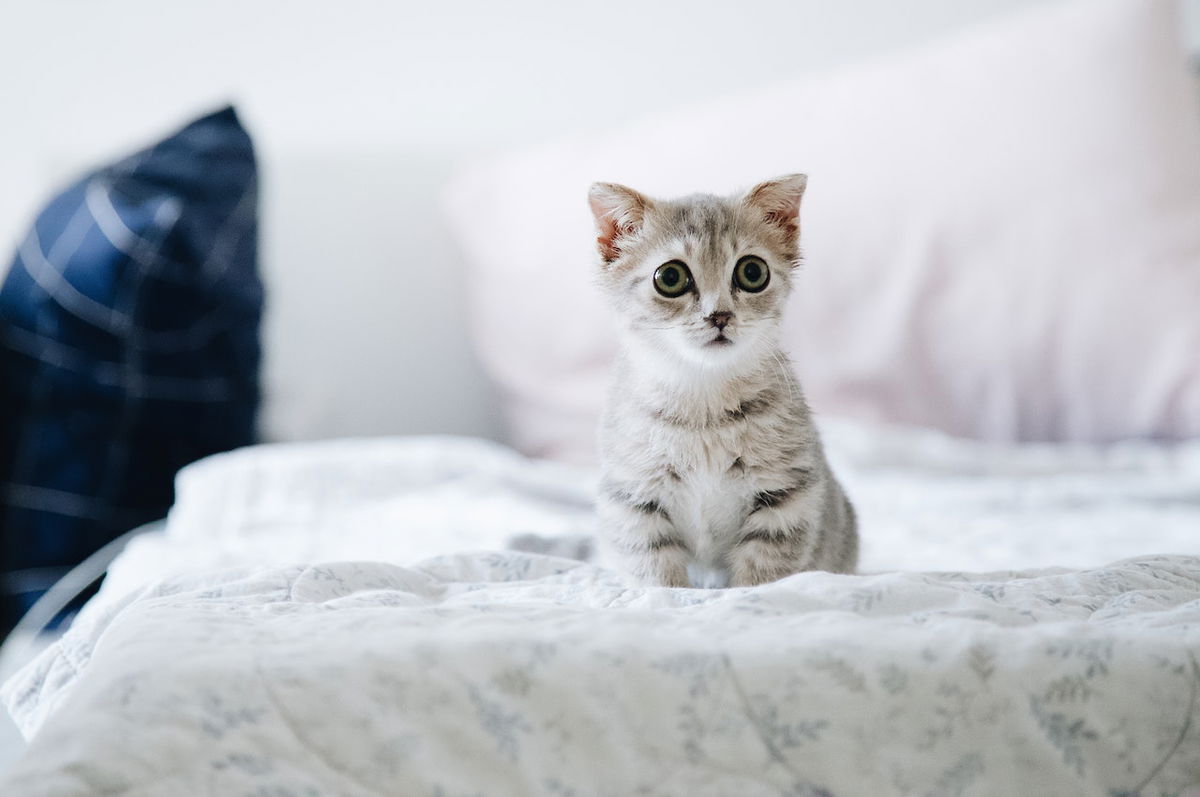
As the young feline gets weaned, they are naturally expected to start using the litter box from observation and training from their mommy.
However, some young cats don’t have the advantage of learning everything from their mother due to early separation or being orphaned.
This is why you need to start house training your cat from an early age, to prevent them from developing bad habits.
2. Inappropriate litter box
Your kitten may get overwhelmed by the massive size of their toileting box, and this can make them avoid using it altogether.
Your choice of litter could also be wrong, and this may push the young cat to urinate outside the box or in comfy areas such as your bed.
Ensure that the litter box is easily accessible to your kitten. These four-legged creatures are small and may struggle to climb into a large, high-sided box.
The box should be small and low enough for them to comfortably enter and exit.
It should also be placed in a quiet, low-traffic area where your kitten can do their business without any disturbances.
3. Type of litter
We recommend trying out different litter types to find the most suitable one with the right texture for your kitten.
Your young cat is more likely to enjoy using unscented and clumping litter, making the housetraining process easier.
How To Stop My Cat from Peeing on My Bed
It is possible to stop and prevent your cat from peeing on your bed, but you need lots of patience and consistency.
Redirecting your cat’s behavior can take time, so we suggest that you bear with the mess for a little while as you work to address the behavior.
1. Veterinary consultation
If your cat shows some signs of sickness in addition to changing their bathroom behavior, then you need to book an appointment with your vet.
Several medical problems in cats can cause them to lose control over their bladder, making them resort to inappropriate urination.
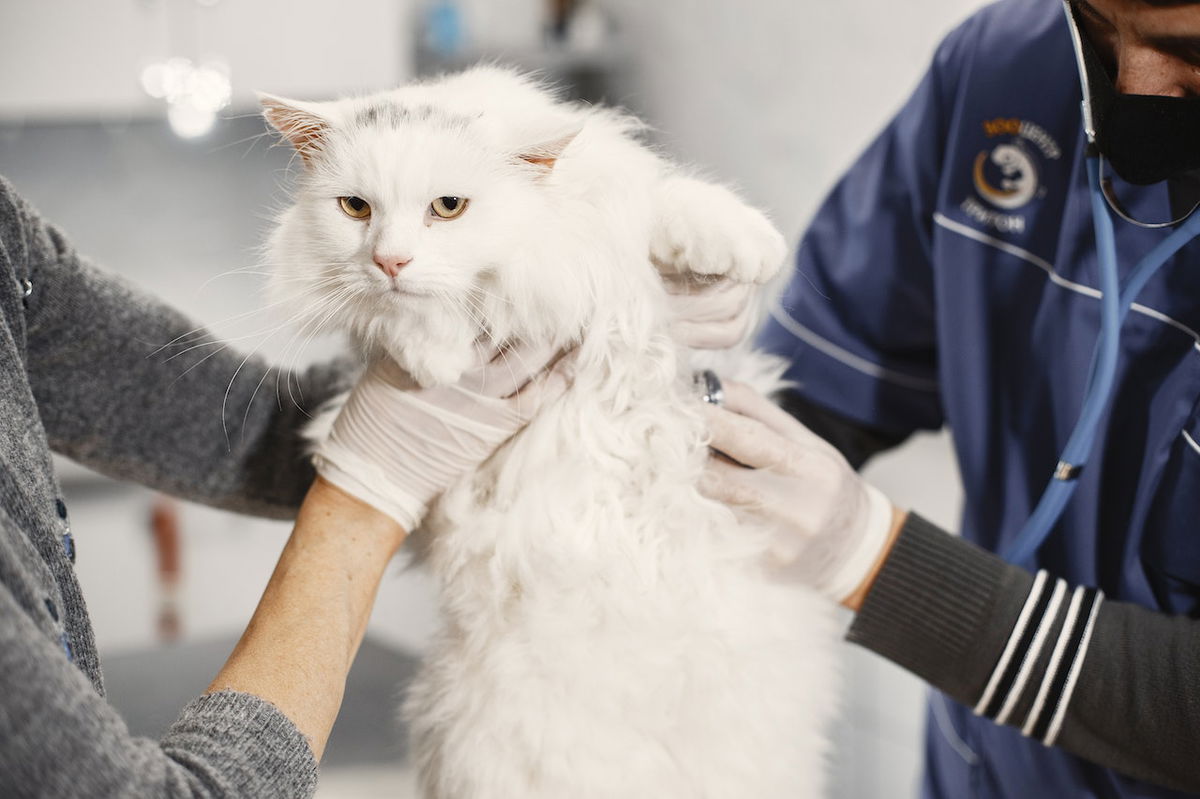
Your vet will conduct a physical examination, followed by blood work and urinalysis to check for the possibility of serious issues affecting your cat.
2. Behavior modification
If your cat is not found to have any health problems, you should shift your focus to redirecting their behavior.
Start by checking the root cause of the problem and identifying possible changes that could make your cat pee on the bed.
Once you’ve identified the potential triggers, work to reverse the changes that will help modify your cat’s behavior back to normal.
Sometimes you may need to retrain your cat on housebreaking rules and set new boundaries to discourage negative behavior.
Make sure to provide a safe place for your cat to relax and stick to a predictable routine to reduce their chances of acting out of fear.
We recommend using positive reinforcement techniques to encourage your cat every time they use the litter box correctly.
This will help in reinforcing good behavior and shunning away from doing that which doesn’t get them any rewards.
3. Litter box placement
The placement of your cat’s toilet can be a deal breaker for good bathroom habits. The box should be placed in an accessible quiet area with less human traffic.
Cats love doing their private business in a secluded area. If you place their cat box in an open space, they may avoid it and sneak into your bedroom to eliminate in privacy.
If you have multiple felines, make sure to have enough boxes for each one of them, plus an extra one just to be on the safe side.
Remember to get cat boxes that match your furry friend’s size and fill them with unscented clumping litter to maintain cleanliness.
4. Reduce stress and provide stimulation
Emotional distress and anxiety can cause your beloved cat to engage in coping mechanisms such as spraying your bed with urine.
Reducing the stress triggers around your home and providing your cat with a safe place to retreat when they feel overwhelmed can help reinforce good habits.
Get some interactive toys, puzzle feeders, scratching posts, and cat trees for your cat to keep them entertained and stimulated mentally.
This will redirect their energy to creating positive fun instead of focusing on developing bad habits.
You also need to exercise your cat daily to expend their excess energy, which could have otherwise been channeled into fueling anxiety or bad behavior.

Finally, create and maintain a consistent routine for managing your cat’s time to reduce their chances of sinking into fear and anxiety.
5. Use pheromones
Using synthetic feline pheromones, such as Feliway Friends, can go a long way in making your cat comfortable and preventing them from inappropriate urination.
These artificial products mimic the cat’s natural appeasing pheromones to create a calm atmosphere in the house and reduce the likelihood of distress.
Synthetic feline pheromones are available in many forms including diffusers, sprays, and cat calming collars.
How To Stop a Kitten from Peeing on The Bed
The best way to prevent and stop your growing kittens from peeing on your bed is by training them on housebreaking rules.
Make sure to introduce the baby cat to the toileting area right from a young age and encourage them to eliminate inside the waste box.
You may also want to limit your kitten’s access to the bedroom area especially when unsupervised to prevent them from having accidents on the bed.
When To Call a Professional
If your cat persists in peeing on your bed despite trying out different solutions, you may have to call a certified animal behaviorist for professional help.
Working with an expert in cat behavior can help you identify specific problems or triggers and they also provide valuable tailor-made insights to help your feline friend.
A cat behaviorist will help in curing other potential problems and this can promote the overall well-being of your furbaby.
Frequently Asked Questions (FAQs)
1. How do you discipline a cat for peeing outside the litter box?
Cats do not understand physical or verbal ‘discipline’ the same way humans do, so we don’t recommend it for your cat.
Disciplining cats should solely focus on identifying the root cause of the problem and redirect them with love.
Use positive reinforcement techniques to reward your cat when they do something right to encourage them to improve on their weak areas.
2. Should I punish my cat for peeing on my bed?
You should never punish your cat for peeing outside their toilet area. Going physical on your cat can cause injuries, increase their stress, and worsen the problem.
Cats do not associate punishment with past actions, so they will certainly not understand why they are being reproved. This can lead to confusion and avoidance behavior.
3. Why is my cat peeing on the dog bed when the litter box is clean?
Several reasons may prompt your cat to pee on the dog bed despite having a clean litter box in their toilet area.
Resource competition between your cat and dog may indicate territorial disputes between the two. Your cat may want to affirm their authority over the dog by marking their bed with urine.
Your cat may also prefer eliminating on your dog’s bed because they prefer the textured bedding over what they get in their potty box.
Medical issues can also cause your beloved cat to foster bad urination habits, so make sure to check with our vet for clearance.
You can prevent this back-and-forth scuffle between the two by learning how to introduce cats to dogs in a rewarding way.
4. Can I use a repellent spray to keep my cat off the bed?
We don’t recommend using repellant sprays to keep your cat away from the bed. As much as using it may work in the short run, we advocate for addressing the issues from the root cause.
5. Why is my spayed female cat peeing on my bed?
Your sexually fixed female cat may spray your bed with urine due to other reasons but not those related to hormonal changes during the heat cycle.
It could be a medical concern or an emotional condition making them cope with the situation by urinating on the bed.
6. Why is my cat peeing and pooping on my bed?
Bed-wetting and pooping in cats are serious concerns that may be caused by medical issues, old age, or behavioral changes to cope with anxiety.
It is also possible that your cat doesn’t like the type of litter you’re using or the box is not kept in mint condition.
Conclusion
We hope that you found the possible reasons and valuable insights on how you can address the behavior.
Just to recap in a few words, your cat may pee on your bed due to reasons ranging from medical conditions, emotional distress, and territorial marking, to an inappropriate litter box.
We encourage you to book an appointment with your vet for your cat to be cleared of any health problems before embarking on behavior modification techniques.
Never punish your cat for their past mistakes since this will only make the problem worse, cause injuries, and you also risk breaking your valuable friendship.
Instead, get the right litter box and place it in a cat-friendly area for ease of use. Use soft unscented litter and don’t forget to scoop the box everyday to keep it in perfect condition.
Laura is the founder of Furs'n'Paws. She is a also a pet writer and expert with more than 20 years of experience of working with dogs and cats. She developed a very strong love for animals at a young age. Her passion led her to establish a thriving pet sitting and dog walking business in Dubai. As an expert in pet training, behavior, and nutrition, Laura is committed to helping pet owners and pet lovers by offering high-quality information on a wide range of topics.


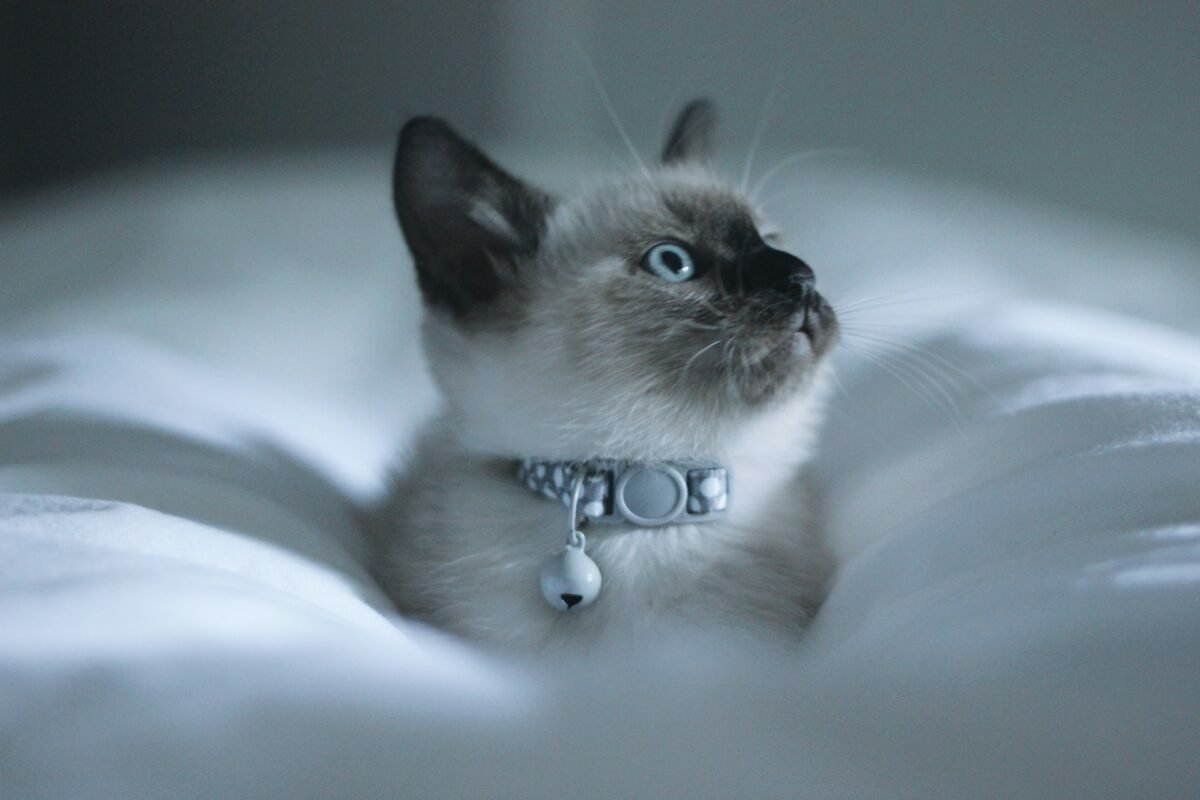
No responses yet